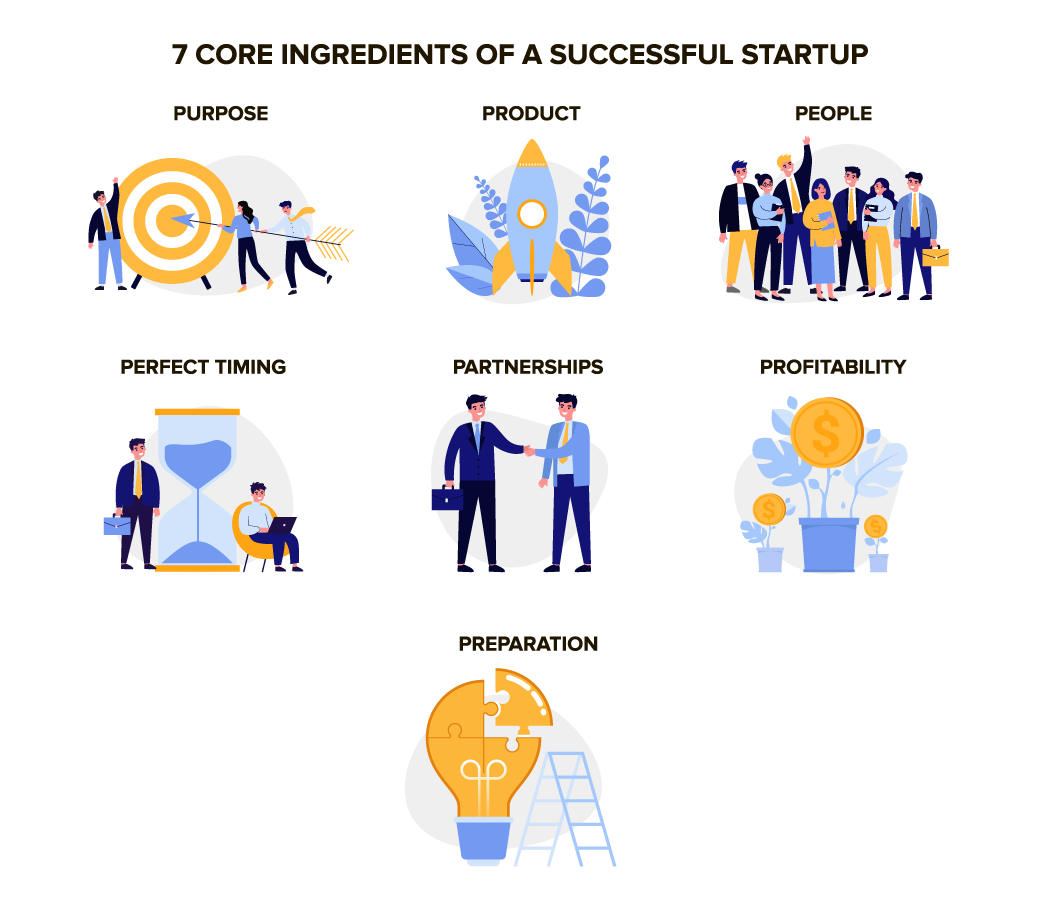Chase the vision, not the money, the money will end up following you.
– Tony Hsieh, Zappos CEO
The territory of the startup is the place of hits and trials which works best for any experiment. Entrepreneurs need all the experience, training, and case studies that will help them collect all the ammunition to tackle challenges and customer pain points with utmost dedication.
2muchcoffee team would like to start a series of articles about startup development. If you’re a first-time founder or have already developed a small business, there is always a place to learn new things and gain knowledge from experts. This article focuses on the major rules you should follow while aiming to build a startup.

Focus on Startup Purpose
Starting with the aim to change the world is great, but this is a blur aim. It’s better to start with an aim for a reasonably large number of people in a particular niche. As to be successful in business, you need to create value for customers. How do you do that? Simply by solving the major pain points and challenges of people.
The most common question among entrepreneurial networks is: “How do I come up with a good idea for a startup?”. It is suggested that the only idea will be enough to build a successful startup. In reality is - no one cares about a good idea. Plus, most startups, unfortunately, have a solution that is waiting for a problem which is not the right approach either.
What is important is practicality. You just have to find the solution to a specific and real problem. Think about creating value for your business by answering the following questions:
Is this startup idea practical?
Does it solve a real problem?
What is the customer paying for?
Businesses and startups are mostly about solutions and then about the financial gains that come out of them. So, to come up with a great great idea is not enough, you should come up with a practical solution. For example, the following pitch will be a suspect: We build productivity tools to save time for anyone using email. A better pitch will be: We build email tools to help busy salespeople become more responsive.
Product Scaling
The cherry on top, the reason why people will download or purchase the result of your work. A great product is the one that, once launched and exposed, will be missed by the target customers in their past.
Another important rule is that the product MUST NOT scale too fast. Quite often, business scale too fast even when they are not profitable. Note, that the business usually goes through certain stages:
You start with a Minimum Viable Product (MVP) - you’re building the absolute minimum that you can take out there and provide to a customer who is able to derive value from it.
Once you have your MVP, you move to Product/Market Fit (PMF). In other terms, you validate your MVP (hypothesis), test it extensively with customers, and use their feedback to improve it so people are willing to use your product on a regular basis.
You move from PMF to Sales-Ready Product (SRP). So you have the product that people want, but there is a lot to do before you can actually sell it - marketing and sells plans, branding, positioning, how to pitch, etc..
From SPR, you have to get to a point where your Customer Acquisition Cost (CAC) is less than your Lifetime Value of customer (LTVC). So, if I’m spending $1000 to acquire a customer, then that customer better make me more than that, so I’ll have a sustainable business.
Once you cross these stages, you can pump in money to scale the business.
Hiring the Right People
It’s time to talk about who is actually going to build the product. Without the right people on your side, your dream will remain a dream. You can hire a freelancer devs or outsource a dev team. One way or another, hiring people should be competent in the right domains and follow certain factors:
Passion Factor: How do you know the core founding team is passionate about what they are doing? Well, you know it because you will be doing what you are doing for the right reasons – especially you will be engaged in it NOT for money but because you truly believe that what you are doing will be world-changing.
Persuasion Factor: This is more important than ever because to take your company to the next level, you will not want help but you will NEED help. There is no other way. Real significant help will come from really smart people and you will need to persuade those people to come and join your cause. Tricks won’t help here as who you are persuading ARE smart people and they will see through your tricks. So, what’s the other option? It is to build real long-term relationships with the ecosystem you are building long before you need to persuade them to come and join your cause.
Persistence Factor: You don’t need a lot of persistence if the plans in your head happily get translated successful in reality. You and I know that is rarely the case. Your plans are hatched in your head and you can never map the terrain and the reactions of the associated players in a real-life situation. So, plans need to be changed often and unless you have the right level of persistence, you will simply get frustrated and after repeated attempts, you will give up and move on.
Perfect Startup Timing
Startup Timing is all about waiting until the world changes so that an important problem goes from impossible to just really hard. After that, you can execute it. For example, as it was with Evernote startup timing – smartphones are on the rise, networks are ubiquitous, storage is cheap and more created a perfect opportunity to build Evernote.
It is easy to dismiss the timing argument with luck. You do that when others get their timing right – Yeah, they were at the right time at the right place. Sadly, that kind of attitude is detrimental in the long run because you shun the responsibility to design and craft a solution that leads to perfect timing.
Right now, assume that you can design for perfect timing. That will force you to think through:
What was impossible before;
How has the world changed to make that something impossible to extremely hard;
How can you assemble a team of people to take advantage of THAT opportunity.
Solid Partnerships for Creating a Solid Company
The right partnerships are amplifiers of your mutual capacity. Your partnerships can extend your influence and/or enhance your ability to fulfill your promise and/or stretch the rewards and/or shorten the time to your goals and more.
No startup is an island and no startup can succeed as an island. It requires a solid ecosystem to become a solid company. Partnerships are harder to build than you can imagine. Why? Because the “good” partners are always busy since a lot of companies are reaching out to them so that they can benefit from their ‘goodness.” On the other hand “not-so-good” partners are ready and willing to listen to you but succeeding in building a partnership with them is useless (and actually can be an opportunity cost) as finally, it will lead to a “not-so-good” outcome.
Long story short – no partnership can give you a free pass, especially in the early stages as it requires a BIG investment from both sides to make this work. But it’s all worth it because the outcomes will be good for both parties.
Profitability
Profit in its simplest sense is revenues minus costs. So, if you are generating more revenues than it costs to deliver the promises associated with these revenues, you are already doing good. However, it’s not that simple in the real world because you keep getting conflicting advice throughout the journey about your priorities. One person might tell you that you should not worry about revenues and profits until you get adoption and critical mass while another person might tell you that you should never lose sight of revenues and profits.
What should you do? Well, it depends on what kind of company you are building and what resources you have to get there. If you are building a company that requires a massive user base and later you can monetize them, you need to start thinking about a path to profitability all the time. You also need backers (mainly investors) who believe that your team will be able to pull this off in the long run and willing to bet on that journey by funding you. If you are not building the above kind of company, you better know how to reach profitability now.
Further Business Preparation
Startups always look simple from the outside. First startups are insanely hard if you are not prepared for the journey that is involved.
It seems like there is a dilemma here. How can you get experience in a startup until you are in one of them? It seems like an impossible requirement. Actually, it’s not. You don’t have to wait for your own startup to gain experience in a startup. If you are a wantrepreneur, right now there are at least a dozen startups around you who are looking for a helping hand. They may not be able to “pay” you but for sure they will trade “experience” for your “contributions.”
Really, there are enough opportunities everywhere for you to get your hands dirty. Here is a bonus – If you are helping any other startups in your own quest to build your own skills, you will win twice – once via building your skills in a not-so-sandbox environment and twice by accumulating good karma. Both will go a long way in your quest to build a world-changing startup.
Check out:
Conclusion
To build a truly successful business, you need to have a strong core. The core defines what you made of, and how you are going to grow. The core defines how your startup will withstand extreme pressure and competition - and survive and win.
Do you have some questions or you have any suggestions? Feel free to contact our team and we will assist you in any inquiry!





